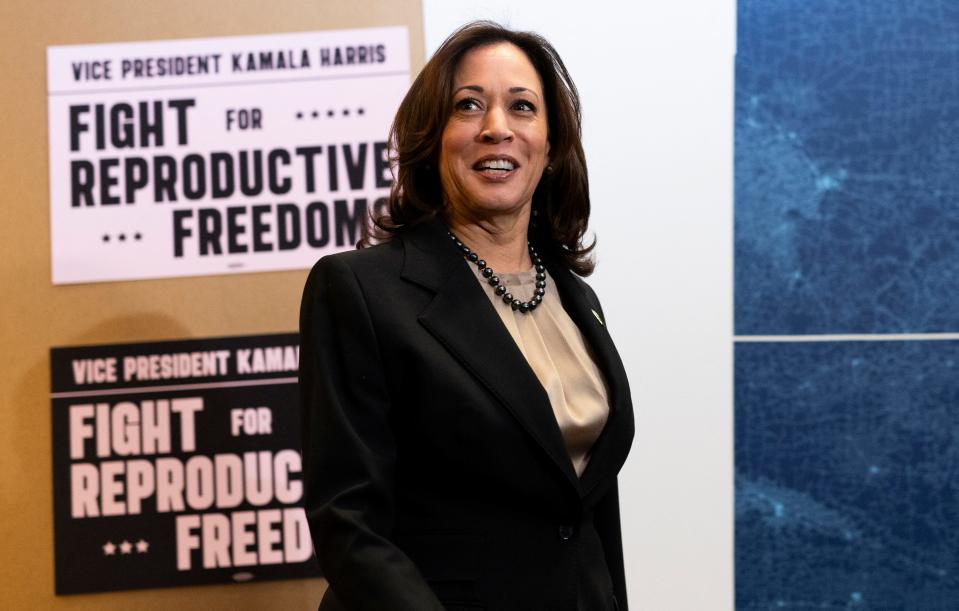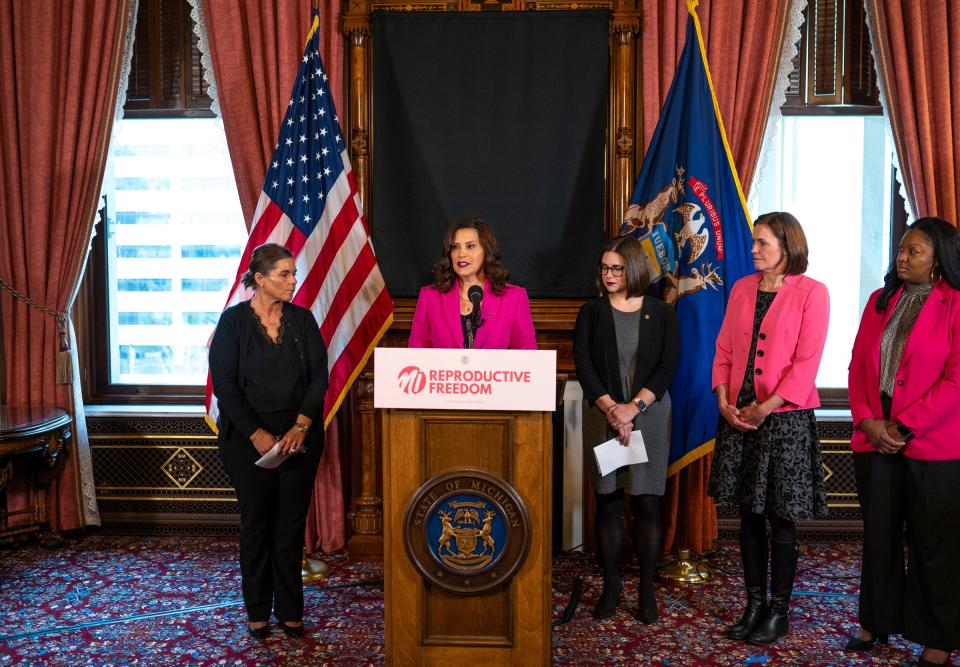Abortion laws are on the books but still on voters' minds in these states
A rallying cry from the left and potential political quicksand for the right, reproductive rights weigh heavily on voters' minds in 2024 – even in states with some of the highest abortion protections.
“It's not affecting women at this point in Michigan,” said Amy DeJonghe, 54, of Dearborn Heights, Michigan. There are currently no gestational limits on abortion in her state.
“But look at how it's spreading, it's spreading like wildfire," she said. "So, who knows. Today, we're protected. We might not be next month, or the month after.”
Nearly two years after the historic overturning of Roe v. Wade, abortion rights are expected to play a key role in the first presidential election since. Democrats are working to turn out voters by reminding them of the role Trump played in removing the federal right to abortion, while many Republicans are dodging what has been a losing issue for them in the 2022 midterms and recent state referendums alike.
A swath of important electoral states, though, have protections in place for reproductive healthcare already.
"That's one challenge the Biden administration is going to face in this campaign, trying to persuade people who are predisposed to support them to not take abortion rights for granted," said University of Minnesota political science professor Paul Goren.
Will abortion be top of mind for voters in 2024?
After the Supreme Court ruled that abortion was to be left to the states, a nationwide scramble to get laws on the books one way or the other ensued.
Amid the resulting patchwork, Democratic candidates prospered in the 2022 midterm elections, and in elections since. And voters have continued to side with abortion access in a series of related ballot measures.
In April, former President Donald Trump said he believes abortion rights should be left to the states.
“My view is now that we have abortion where everyone wanted it from a legal standpoint, the states will determine by vote or legislation, or perhaps both,” said Trump in a video on Truth Social. “At the end of the day, this is all about the will of the people.”
In the same video, Trump said that he was “proudly the person responsible” for the overturning of Roe v. Wade, having appointed several of the justices on the Supreme Court. However, days later he said he would not sign a federal abortion ban if elected to a second term.
Meanwhile, President Joe Biden has campaigned heavily on abortion rights and has said that he would write protections for reproductive freedom into law.
“President Biden is fighting to pass federal legislation to protect reproductive freedom across the country and has taken executive action to strengthen reproductive health care access,” the Biden campaign said in a statement.
In states with close polling numbers, Goren said abortion could be pivotal in a close race.
"Biden has to convince [voters], despite whatever reservations you may have [about him]," he said, "abortion rights, reproductive rights are on the ballot."
A shaky granite road ahead
Concord resident Pam Sinotte, 67, supports New Hampshire’s current abortion law, which with a ban after 24 weeks is not nearly as restrictive as many other states. But that doesn’t mean abortion isn’t motivating her at the polls.
“I’m just devastated about what happened with Roe,” she said. “I don’t think that decision should be left to the states. I think it should go back to the way it was.”

This year, a New Hampshire House Republican introduced a 15-day abortion ban that failed to pass. Dean Spiliotes, a civics scholar at Southern New Hampshire University, said fear of further abortion restrictions from politicians, despite what they may say publicly, will likely be a major factor in turnout.
“It's the fear they say one thing to get into office, but then when that person gets in there, they actually do something far more restrictive,” Spiliotes said.
According to a late May poll from UMass Lowell, 66% of New Hampshire Republicans also believe there should be a right to get an abortion in every state of the U.S. The poll surveyed 600 likely New Hampshire voters and had a +/-5.42% margin of error.
“Abortion is an issue where New Hampshire Republicans' libertarian 'live free' tendencies tend to come out,” said Dante Scala, a professor of political science at the University of New Hampshire.
"Here in New Hampshire, people feel very ... attached to their freedoms," said OBGYN Dr. Ellen Joyce.
A reproductive sanctuary state
The fall of Roe catapulted Minnesota Democrats to the polls where they won in record numbers, giving the party a trifecta. State abortion law already had protections for reproductive care, but the state became the first to pass a law strengthening them after the Supreme Court decision.

Erin Berthelsen of southeastern Minnesota, 42, isn't convinced that's enough to protect those privileges from a second Trump presidency.
"You can never trust what he says," the lifelong Democrat said. "He says to leave it up to the states, but who knows what's going to happen."
The mostly blue state hasn't elected a Republican president since 1972, but Trump has made it clear it's in his sight. Recent data from the non-partisan pollster Public Religion Research Institute found that most Minnesotans favor abortion protections. Berthelsen said she hopes they don't take their state rights for granted.
"I'm a little nervous about people who don't like either candidate (who will say) 'Our state is okay, so I don't need to show up,'" she said.
For 21-year-old Carrena Falls, abortion is her number one issue sending her to the polls. The pro-life graphic designer and student said despite not being "at all satisfied" with Trump's stance on abortion, her first presidential vote will be for him.
"I'm voting against abortion extremism wherever I can," she said.
Even though she lives in the mostly blue state where a change to reproductive policy is unlikely, the Minneapolis native said she's using her vote against Biden and the Democratic party's abortion agenda.
Falls doesn't credit the fall of Roe to Trump, saying that he is far from the type of anti-abortion politician she wants to see hold the high office.
"People like to paint Joe Biden and Trump as two opposite ends of the spectrum," the independent said. "But, really, it's Biden on one far end of the spectrum and Trump is a little bit in the middle."
Biden, Goren said, has a long road ahead of him.
Key to the swing states?: Arizona and Pennsylvania voters think Biden will handle abortion issues better than Trump
"The challenge for the Biden campaign is to convince some of these [undecided] voters, and moderates as well, as well as folks on his base, that this decision is really important," he said.
'I can't just sit back'

Months after Roe fell and abortion decisions returned to the states, Michigan voters backed a constitutional amendment enshrining reproductive rights. And the issue is credited for major Democratic wins in the 2022 midterm elections after Gov. Gretchen Whitmer made abortion a cornerstone of her reelection campaign and defeated challenger Tudor Dixon by a whopping 11 points.
Abortion is currently legal in Michigan throughout pregnancy.
Still, reproductive rights remain a top voter concern in the midwestern swing state.
Carol Godwin, 83, from Livingston County said abortion is “very much” on her mind this year.
“I can't just sit back because everything's fine with me,” she said. “I'm not going to be getting pregnant, but you know, I have granddaughters, and if something were to go wrong, I'd want the best care for them.”
Michigan Democratic state Sen. Mallory McMorrow said she believes many of her constituents are “very plugged in” on how 2024 outcomes could impact abortion access.
“The case that we've been making to voters is, 'we've made a lot of progress in Michigan',” McMorrow said. “All of that can be undone with one federal election.”
Sam Woodward can be reached at [email protected]. Savannah Kuchar can be reached out [email protected]. Margie Cullen can be reached at [email protected].
This article originally appeared on St. Cloud Times: Even where it's settled law, abortion is motivating voters
